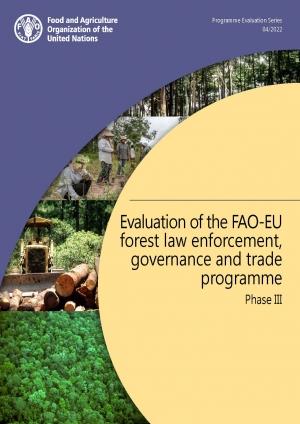Completed evaluations

Terminal evaluation of the project "Securing biodiversity conservation and sustainable use in China’s Dongting Lake Protected Areas"
13/04/2022
This publication presents the findings of the terminal evaluation of the project ‘Securing biodiversity conservation and sustainable use in China’s Dongting Lake Protected Areas’ implemented in China’s Hunan Province. The project was designed to address key barriers to biodiversity conservation.

Evaluation of the FAO-EU forest law enforcement, governance and trade programme – Phase III
11/04/2022
The FAO-EU forest law enforcement, governance and trade (FLEGT) programme seeks to reduce and eventually eliminate illegal logging. The FAO-EU FLEGT Programme funds projects created by governments, civil society and private sector organizations in Latin America, Africa and Asia to improve forest governance and promote trade in legal timber products on domestic and international markets.

Evaluation of five FAO projects funded by the Swedish International Development Cooperation Agency in Cameroon, Chad, Mali and the Niger
15/02/2022
The evaluation aims to contribute to organization-wide learning by drawing lessons from multi-year funding resilience projects implemented in the Sahel and Cameroon and making recommendations for future programming. FAO intervened in these countries to strengthen the resilience of vulnerable households affected by the crisis in the Sahel by promoting sustainable livelihoods.

Evaluation of the third project cycle of the Benefit-sharing Fund of the International Treaty on the Plant Genetic Resources for Food and Agriculture
15/02/2022
Nine recommendations emerge from this evaluation of the third project cycle of the Benefit-sharing Fund (BSF). The evaluation assessed the results of the programme and provided lessons learned and recommendations to inform the further development of the BSF programme.

Terminal evaluation of the project "Participatory assessment of land degradation and sustainable land management in grassland and pastoral systems"
10/02/2022
The project ‘Participatory assessment of land degradation and sustainable land management in grassland and pastoral systems’ was implemented from 2017 to 2021 in Burkina Faso, Kenya, Kyrgyzstan, the Niger, and Uruguay.

Evaluation of the project "Restoration of peace and dialogue between communities affected by cross-border transhumance" in the Central African Republic and Chad
10/02/2022
Evaluation contributes to institutional learning and programmatic improvement by drawing lessons from UN peacebuilding projects (funded by the PBF). The evaluation examined the project implementation process and peacebuilding results in the Central African Republic and Chad. [French only]

Mid-term evaluation of the project “Mainstreaming sustainable land development and management”
03/02/2022
The mid-term evaluation of the project "Mainstreaming sustainable land development and management” was executed by the Guyana Land Survey Commission (GLSC), implemented by FAO and funded by the Guyana Reducing Emissions from Deforestation and Degradation (REDD+) Investment Fund (GRIF).

Terminal evaluation of the project "Sustainable management of mountainous forest and land resources under climate change conditions"
01/02/2022
The project was designed to address the following interlinked barriers preventing sustainable land and forest management outcomes and building resilience to climate change in Kyrgyz mountain ecosystems: inadequate legal framework for sustainable forest and land management, inadequate land tenure reforms, outdated approaches to sustainable forest and land management, and limited capacity of local institutions.

Evaluation of the project "Emergency response and support to vulnerable populations in at-risk areas of Burkina Faso" - Phase I
25/01/2022
The project "Emergency response and support to vulnerable populations in at-risk areas of Burkina Faso" is financed by the Swedish International Development Agency. FAO implemented the project in partnership with the Government of Burkina Faso through the Ministry for Agriculture, Hydraulic Installations and Meccanization.

Evaluation of the project “Increasing smallholder productivity and profitability”
24/01/2022
FAO’s “Increasing smallholder productivity and profitability” (ISPP) project funded by the United States Agency for International Development (USAID) and implemented by FAO in Kenya had the objective to improve livelihoods through enhanced productivity, market linkages and better nutrition.
